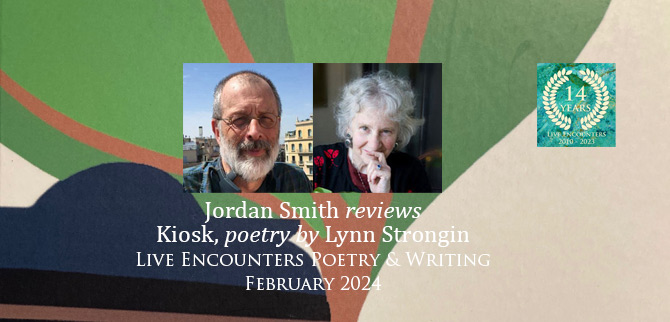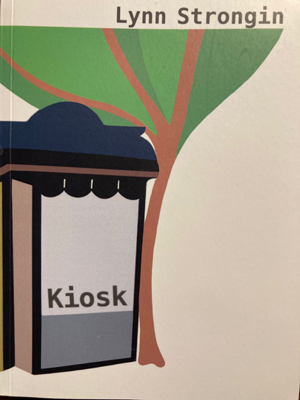
Live Encounters Poetry & Writing February 2024.
Kiosk by Lynn Strongin, book review by Jordan Smith.
Liverpool UK: erbacce-press, 2023. 72 pp.
Avaialble at https://www.erbacce-press.co.uk/lynn-strongin
 In Kiosk, the most recent collection from Lynn Strongin– feminist, disability activist, polio survivor, as well as an accomplished poet with nearly half a century’s worth of innovative publications to her credit–the heart’s place might seem to be the home described in “MOON GLYPHS over Invisible Landscape”:
In Kiosk, the most recent collection from Lynn Strongin– feminist, disability activist, polio survivor, as well as an accomplished poet with nearly half a century’s worth of innovative publications to her credit–the heart’s place might seem to be the home described in “MOON GLYPHS over Invisible Landscape”:
My writing-room
awash in brown-pink sunset,
books,
photographs
From our kitchen we can see Elizah
In her rocking chair, her shadow only…
And yet other shadows deepen this sunset scene past comfort: a former tenant who “sat in the same window circle of light / reading library books / & taking notes,” the speaker’s failing health as she sinks “back in bed / As into lake water” and extends a hand, the “beloved,” to whom it is offered, the “patience” and the “apocalyptic predictions” which are the givens of their lives, “not the way / we want to see it play out.” There is a futile longing to travel and an imperative “to litigate these / eerie hieroglyphs in clouds? / To adjudicate … / Elizah in her rocking chair / Cindy in the circle of light.” These measures of absence, like William Carlos William’s lament that there is “no one to witness and adjust,” are reminders that a poet requires, as well as the immediacy of empathy, the distance of understanding that is found as much in the imagination as it is in observation and memory, as much in the use of a persona as in direct revelation.The voice Strongin chooses in many of these linked poems is the resident proprietor of a newspaper kiosk near Central Park in a time of pandemic, homelessness, and other fragilities, other resiliencies, in a space that seems the opposite of the poet’s domestic orderliness:
… love and its letdowns.
I thought we would be
A woodcut
gentle, severe
Early American.
Tapped like sugar
Tears
Amber as honey. The sting
Of balance books, multiplication, integers o lord,
Division lessened by
Ash blue-bonnets, Scottish shawls against cold,
against despair, Jewish mysticism …
(“THAT CURSIVE, learned half a century ago,”)
Like a Hamlet’s nutshell, “my kiosk is reality multiplied,” like Whitman’s self, it exists where neither time nor space impose their limitations. Memories are part of what it holds—of England and training in the theatre, of “Ilse and me cupping our hot coffee, / faces wreathed in steam, / walking along the Thames,” of “Her last time, on the boards, / her beatitudes spoken in a voice / harsh with age but modulating / like the leading alto into a trouser role.” And there are hopes recalled as sharply as are their attenuations:
… love and its letdowns.
I thought we would be
A woodcut
gentle, severe
Early American.
Tapped like sugar
Tears
Amber as honey. The sting
Of balance books, multiplication, integers o lord,
Division lessened by
Ash blue-bonnets, Scottish shawls against cold,
against despair, Jewish mysticism …
(“THAT CURSIVE, learned half a century ago,”)
The kiosk contains material enough for a picaresque memoir, and this hardly exhausts its possibilities. It is a sensibility, including, spread over several poems, a consideration of Las Meninas of Velasquez, which is also a kind of “reality multiplied”:
Velasquez’s unidentifiable child whom I see as a child-eunuch
her rustling crackling taffetas in stage-right,
traces of her or his whole world having been burned;
tiny androgyne
like ice breaking on the lake this morning
(“Chimney Terraces,”)
The ambiguity of gender and agency, the apocalyptic crackling anticipating a burning world, the lake’s ice, are the poet’s, not the painter’s, recurrences within a sensibility that includes Dickens and Schubert and Henry Moore, polio and COVID-19, that thrives on correspondences and repetitions, and reconsiderations, that situates itself at once in the midst of life (as a vendor who works near an urban park with a bakery two blocks away, who wears red stockings, who asks the passersby “What is your deep request,” who meditates on “Scattered / Sacred things,” of which the eunuch/girl in the Velasquez painting is one) and at the remove of a persona, often fused with the poet, finely attuned to “vulnerability, which shines everywhere.”
Kiosk is dedicated to this vulnerability to “the homeless; all over this world.” Who better to observe and empathize than the news-seller in a kiosk on their urban ground, than the poet who understands the radical isolation of patients “housed / in in multiple iron lungs filling rooms / like stainless steel lace,” who found two friends–Celine (“small cigarette burns / all over her arm”) and the invented Annie (“Sometimes, you drew her in a collar of lace / Or like arrow & bow / drew her to hit the target, / unnamable”)—in a monastery’s eating disorders ward where she also discovered her vocation, “talent having beat starvation.” In “STRANGE CHILDREN, those with swan necks,” she incorporates Bob Dylan’s phrase, “no direction home,” and it makes perfect sense to be reminded of the singer’s paeans to the virtues of the dispossessed life (“when you ain’t got nothing, you got nothing to lose” and “to live outside the law you must be honest”) when face to face with this book’s insistence that dislocation can transport us where we most need to go. Like Sandra McPherson’s Speech Crush, another recent collection that takes up the experiences of aging, illness, and the institutions of healing and holds these to the light of candor and understanding, that looks hard at the damage and partial redemptions we experience as we go on, Strongin’s Kiosk reasserts what we need most as we witness and adjust, as we travel: clarity and capaciousness of heart.
© Jordan Smith
Jordan Smith is the author of eight full-length books of poems, most recently Little Black Train, winner of the Three Mile Harbor Press Prize and Clare’s Empire, a fantasia on the life and work of John Clare from The Hydroelectric Press, as well as several chapbooks, including Cold Night, Long Dog from Ambidextrous Bloodhound Press. The recipient of fellowships from the John Simon Guggenheim and Ingram Merrill foundations, he is the Edward Everett Hale Jr., Professor of English at Union College.
Lynn Strongin is a Pulitzer Prize nominee in poetry. A recipient of a National Endowment Creative Writing Grant, nominated twice for Pushcart Prizes, Lynn Born in NYC at the end of the dirty thirties, she grew up in an artistic Jewish home in New York during the war. Earliest studies were in musical composition as a child and at The Manhattan School of Music. Took a BA at Hunter college, MA at Stanford University graduation as a Woodrow Wilson Fellow. Lived in Berkeley during the vibrant sixties where she worked for Denise Levertov and took part in many peace demonstrations. Poems in forty anthologies, fifty journals; Poetry, New York Quarterly. Forthcoming work in Poetry Flash and Otoliths. Canada is her second home. The late Hugh Fox said Strongin is the “most exciting poet writing today.’ Danielle Ofri wrote to her, “you tear the veil off that mysterious disease polio.” Strongin’s work has been translated into French and Italian. Her forthcoming book is THE SWEETNESS OF EDNA She recently received a ten-thousand dollar Emergency George Woodcock Grant for Writers from The Writers’ Trust of Canada and has been nominated for LIFETIME ACHIEVEMENT IN WRITING in British Columbia, and an HONORARY DOCTORATE from The Manhattan School of music. Her latest book is KIOSK (Erbacce press).She is currently working on a new book of poems ALTO SONNETS: for a dark time.

